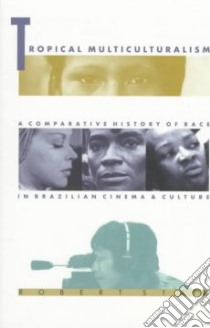Tropical Multiculturalism - 9780822320487
Un libro in lingua di Stam Robert, Mignolo Walter D. (EDT), Silverblatt Irene (EDT), Sald & iacute var-hull Sonia (EDT) edito da Duke Univ Pr, 1997
- € 29.00
- Il prezzo è variabile in funzione del cambio della valuta d’origine
Tropical Multiculturalism provides a major study of race in Brazilian culture through the most complete critical analysis of Brazilian cinema in any language. Focusing on representations of multicultural themes involving Euro- and Afro-Brazilians, other immigrants, and indigenous peoples in the rich tradition of Brazilian fictional feature film, Robert Stam puts Brazilian culture at the center of a wide-ranging analysis of race, representation, history, and film. Drawing parallels between the histories of colonialism, slavery, and immigration in Brazil and the United States, he also contends that questions of ethnic and racial representations are best viewed within the larger context of a comparative analysis of racially plural societies.
Stam examines the broad historical and cultural links that connect Brazil and the United States before considering multicultural imagery in Brazilian film as it has changed from the silent era to the present. His analysis moves through the comic chanchadas of the 1930s and 1940s, to the Hollywood-style films from Sao Paulo in the 1950s, and the diverse phases of Cinema Novo beginning in the 1960s. He explores a wealth of subjects, including the submerged "blackness" of Carmen Miranda, the anti-racist agenda of Orson Welles's never-released Brazilian film It's All True, the international background behind Black Orpheus, the career of Grande Otelo (Brazil's greatest black film star), the allegorical "cannibalistic" films like How Tasty Was My Frenchman, and "indigenous media"—the attempt by Brazilian "indians" to use camcorders and VCRs for their own cultural and political purposes. Tropical Multiculturalism is simultaneously a history of Brazilian cinema from the standpoint of race, a history of Brazil itself through its cinematic representations, a comparative study of racial formations in Brazil and the United States, and a theorized analysis of racialized representations.
Stam examines the broad historical and cultural links that connect Brazil and the United States before considering multicultural imagery in Brazilian film as it has changed from the silent era to the present. His analysis moves through the comic chanchadas of the 1930s and 1940s, to the Hollywood-style films from Sao Paulo in the 1950s, and the diverse phases of Cinema Novo beginning in the 1960s. He explores a wealth of subjects, including the submerged "blackness" of Carmen Miranda, the anti-racist agenda of Orson Welles's never-released Brazilian film It's All True, the international background behind Black Orpheus, the career of Grande Otelo (Brazil's greatest black film star), the allegorical "cannibalistic" films like How Tasty Was My Frenchman, and "indigenous media"—the attempt by Brazilian "indians" to use camcorders and VCRs for their own cultural and political purposes. Tropical Multiculturalism is simultaneously a history of Brazilian cinema from the standpoint of race, a history of Brazil itself through its cinematic representations, a comparative study of racial formations in Brazil and the United States, and a theorized analysis of racialized representations.
Informazioni bibliografiche
- Titolo del Libro in lingua: Tropical Multiculturalism
- Sottotitolo: A Comparative History of Race in Brazilian Cinema and Culture
- Lingua: English
- Autori : Stam Robert, Mignolo Walter D. (EDT), Silverblatt Irene (EDT), Sald & iacute var-hull Sonia (EDT)
- Editore: Duke Univ Pr
- Collana: Duke Univ Pr (Paperback)
- Data di Pubblicazione: 01 Dicembre '97
- Genere: PERFORMING ARTS
- Argomenti : Motion pictures Brazil Race relations in motion pictures Racism in motion pictures
- Pagine: 409
- Dimensioni mm: 241 x 165 x 31
- ISBN-10: 0822320487
- EAN-13: 9780822320487


